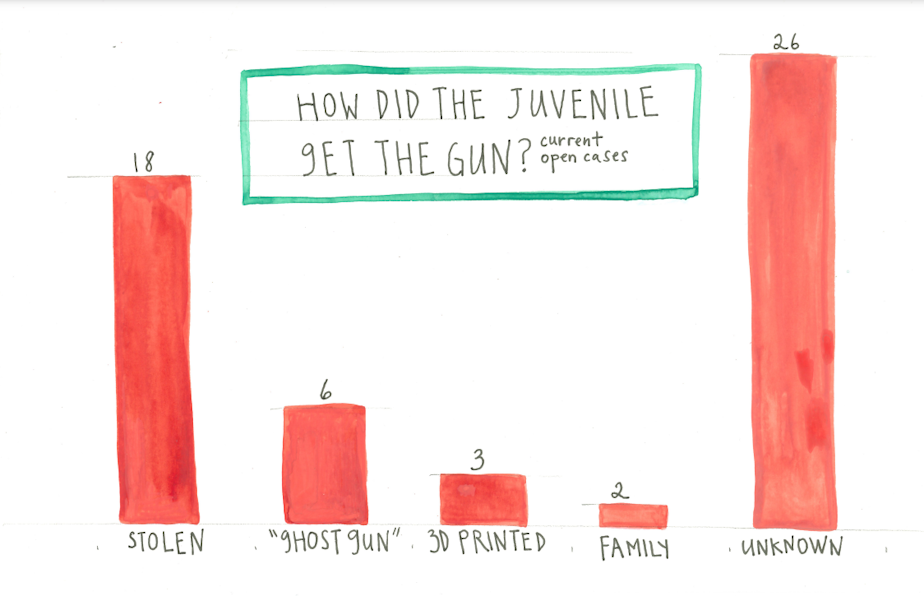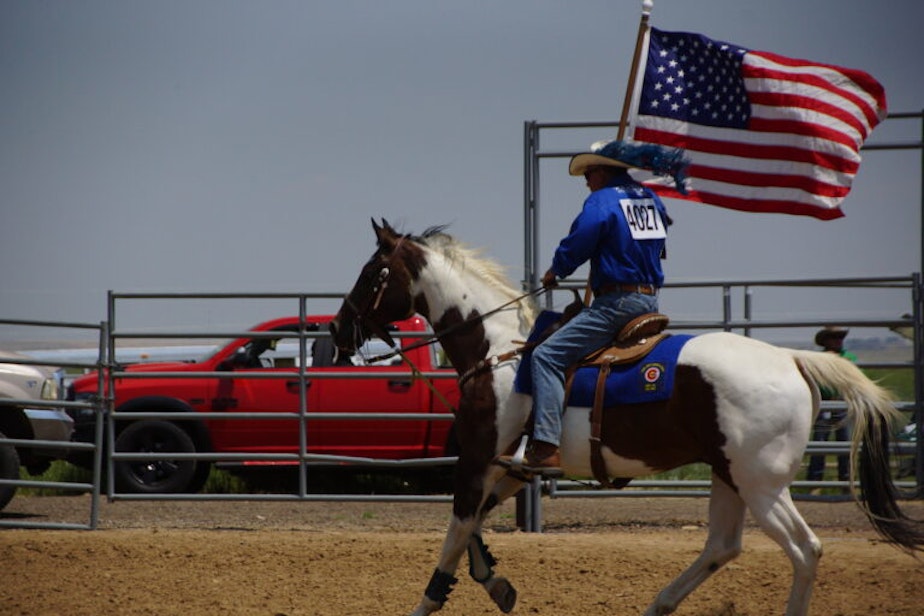Where are the guns coming from? Today So Far

- The gun used in the Ingraham High School shooting was a stolen firearm. KUOW traces it back to its owner.
- Where are teens getting firearms?
- Covid and summer 2023.
- Dave Reichert has entered the race for Washington governor, even though he hasn't told anyone yet.
This post originally appeared in KUOW's Today So Far newsletter for July 3, 2023.
Quick hits
- What does a new consulate in Seattle say about U.S.-India relations?
- Man who stalked and threatened Rep. Jayapal to lose guns for 8 years
- Where to see July fireworks shows around Western Washington 2023
It's been less than a year since the fatal and tragic shooting at Seattle's Ingraham High School. Police reports following the incident stated that the Glock 32 used in the shooting was a stolen firearm, from a home in nearby Lynnwood. That has left a lingering question as to where it originally came from.
The short answer: The gun owner did not lock up the firearm, in a home where children were present.
The long answer: The gun owner's teenage son was able to easily access the weapon, which he did to show his friends. One 14-year-old friend took the gun, after which it exchanged hands and was used in a crime before ending up at Ingraham High School.
For the full story, KUOW's Ashley Hiruko and Isolde Raftery have that here.
A total of 68 kids under the age of 18 died by a firearm in King County between 2017-2022, whether it was suicide or homicide. Among that number, 18 of the guns were stolen, six were ghost guns, three were made with a 3D printer, two were from family, and 26 have unknown origins.
In April 2023, there were 54 open cases involving guns and teens ages 12-17. The majority were ages 14-16. And most of the cases are out of South Seattle and South King County. These are among the insights that KUOW uncovered while reporting on kids and firearms in the Seattle area.
Over the past few summers, Washington saw spikes in Covid cases that prompted concern and distancing. Things are a bit different this summer. Covid hospitalizations and deaths are at the lowest levels since the start of the pandemic. Still, there were 15 Covid deaths per week in early June.
Having three years of experience with the virus, local health officials are not easing up on Covid vigilance.
“We know Covid-19 tends to throw curveballs when we least expect it,” said Dr. Eric Chow with Public Health – Seattle & King County.
"Either a new variant comes about, or because of people's activities and changes in behavior since exiting kind of that emergency phase of the Covid-19 pandemic, it's possible that we could see an uptick and that's something that we're always looking out for."
Despite a person's chances of overcoming Covid, Chow notes that long Covid is also a concern. KUOW's Kate Walters has the full story here.
One last bit of news this morning, Dave Reichert has entered the race for Washington governor. Reichert filed his paperwork with the state last Friday, so he's technically official, but so far that is all he has done. As of this morning, there has been no announcement, no campaign website, or social media blasts — the usual activity when someone as prominent as Reichert kicks off a campaign.
In case you need a refresher, Reichert is known around these parts as a Congress member from Washington's 8th District. He was also King County sheriff, and he even helped bring in the Green River Killer. Read more here.
AS SEEN ON KUOW

DID YOU KNOW?
In Washington state, from spring through fall, chances are there is a rodeo happening somewhere in the state. There are a lot around here.
We get the word "rodeo" from the Spanish word "rodear," which translates into "go around." But the concept of this term as we know it today, a western culture show, didn't come about until more recently. Before that, a rodeo was concept in Mexico for managing cattle. People would round up cattle in a large area and herd them into a smaller area where they could be branded. Alongside this cattle culture in Mexico were the traditions of bull wrestling and riding. These Mexican practices spread into the American West over the 1800s with the rise of the cowboy. The Mexican-American War also resulted in American exposure to rodeo practices. There was also a rise in western entertainment shows, circuses, etc. One example is Bill Pickett, a Black cowboy from Texas who is credited with inventing the rodeo practice of bulldogging, which is wrestling a bull to the ground. That evolved into steer wrestling. Pickett performed this feat in traveling shows.
That's where much of the attractions we associate with modern rodeos were isolated to in the late 1800s — traveling shows and Wild West shows. These were folded into rodeos as we know them in the early 1900s, when the name started to catch on. In fact, the use of the word "rodeo" didn't start to rise in popularity until about the 1920s, and sharply rose in the 1980s.
ALSO ON OUR MINDS

Advocates estimate that 114,000 troops were pushed out of the service over the decades due to their sexual orientation, often with a less-than-honorable discharge. That means no automatic VA benefits or free VA health care. It makes getting a civilian job tough because employers often ask about military service. Many vets find it easier to omit that they served rather than explain an other-than-honorable discharge.

